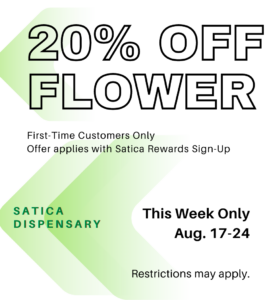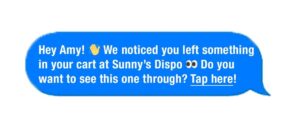How to Re-Engage Lost Dispensary Shoppers
It feels like far too often, potential customers shopping at your dispensary ” whether in-person or online ” come close to making a purchase but seem to decide against it at the last moment. The customer’s reasons for not following through with the purchase are difficult to pin down. They may be short on cash. They may have found a more compelling option. Or, as is often the case with online sales, they may have simply forgotten about it.
While the exact reasons are hard to know, one thing is for sure: these sorts of failed sales are among the most frustrating things that can happen for dispensary owners. In this article, we take a look at some strategies you can employ in order to close out these sales. We talk about loyalty programs, how to respond to e-commerce cart abandonment, targeted promotions, and providing personalized guidance for your customers. Stick with us.
Cannabis Dispensaries and their Customers

The customers who make up the cannabis industry ” from recreational adult-use to medical marijuana ” span all backgrounds, incomes, and preferences. As the cannabis market continues its emergence, cannabis retailers have begun to reflect this diversity. Today, dispensaries come in all shapes and sizes. They use a wide range of themes and messaging to appeal to different communities, leading different crowds to find that different dispensaries most suit their preferences.
With this wide range of cannabis consumers, it becomes difficult to understand specific intentions and motivations for certain consumer behavior, including for trying to understand why a customer failed to complete a purchase.
Many, when faced with the frustration of an incomplete purchase, think that they can convince a shopper to complete their purchase if only they understand why the shopper stopped in the first place. This too often leads dispensary owners and employees to make wrong assumptions about their customers ” and rarely leads to these sales being actually completed.
All dispensaries want to minimize the amount of incomplete purchases they experience. The first step to doing so, however, is somewhat counter-intuitive:
Do not try to guess why.
There are a million possible explanations, and whatever you come up with will never be more than a guess. Instead, you should employ methods which create a shopping environment and customer experience that makes incomplete purchases less likely. In other words, the solution is one that is proactive rather than reactive. C’mon, I know you’ve heard that one before.
Let’s take a look at how cannabis dispensaries can be proactive in limiting incomplete purchases.
Online versus In-Store Incomplete Purchases
 Of course, whether a customer is shopping online or actually inside your brick-and-mortar dispensary will influence how you address incomplete purchases. When an online customer fails to complete their purchase, it typically means they added a product or products to their cart and never checked out. When an in-person customer bails, it typically means they entered your dispensary, browsed, and left. In some cases, these in-person customers will take special interest in particular products before leaving without them.
Of course, whether a customer is shopping online or actually inside your brick-and-mortar dispensary will influence how you address incomplete purchases. When an online customer fails to complete their purchase, it typically means they added a product or products to their cart and never checked out. When an in-person customer bails, it typically means they entered your dispensary, browsed, and left. In some cases, these in-person customers will take special interest in particular products before leaving without them.
While certain strategies will promote your customers’ completing their sales regardless of how they are shopping, other strategies will only be effective for one type. Let’s take a look.
Creating Customers with Purpose
The vast majority of completed purchases come from customers who began shopping with an intent or incentive to actually buy. While appealing to customers who stumbled upon your website or storefront is certainly an important consideration in your overall marketing strategy, these customers are also the most likely to lead to an incomplete purchase.
Your job is to incentivize these “browsing shoppers” to actually follow through with their purchases. How? Giving them purpose ” in the form of a good reason to actually checkout and make a purchase. Make it worth their while.
“Limited Time Only” Promotions
 Whether these “browsing shoppers” are online or in-store, they can be incentivized through well-implemented promotions. A strong promotion geared at “browsing shoppers” will give them a sense that they have access to a deal that will expire if they do not act on it now. With a sense of urgency, the customer will likely continue their shopping experience with a sense of intention. A purchase becomes worth their while because they can claim a great deal. Call it purpose.
Whether these “browsing shoppers” are online or in-store, they can be incentivized through well-implemented promotions. A strong promotion geared at “browsing shoppers” will give them a sense that they have access to a deal that will expire if they do not act on it now. With a sense of urgency, the customer will likely continue their shopping experience with a sense of intention. A purchase becomes worth their while because they can claim a great deal. Call it purpose.
What might a strong version of these promotions look like?
The cannabis industry is no stranger to “first-time customer” promotions. With these, first-time customers are incentivized to make a purchase because they have exclusive access to a certain discount or special offer. However, while “first-time” promotions are a great marketing tactic that can have great results, they do not seem to turn would-be purchases into actual purchases. Why? Because they (usually) do not have an expiration.
A browsing shopper can be well aware of and eligible for the first-time shopper promotion but leave regardless. They may just tell themselves that they will return in the future and cash in on the promotion.
So, to make a first-time shopper promotion also incentivize the browsing shopper, you should give it an expiration date, like “This week only!” Next week, you can install a different promotion. By giving the browsing shopper a sense that there is a time crunch on their offer, they are more likely to actually close out the purchase.
For example, see this promotional flyer:

Notice how the flyer accomplishes three main things. First, it incentivizes a would-be purchaser with a discount promotion. Second, it attaches a sense of urgency by giving it an expiration date. Third, it requires the customer to sign up with the dispensary, allowing you to keep them in the loop with future marketing material and increasing the chance of them becoming a future regular customer.
Loyalty Programs
While the strategy above is effective for those “browsing shoppers” who come through your cannabis dispensary on curiosity alone, your existing customers ” even your regulars ” can also occasionally become sources of incomplete purchases.
A strong response to existing customers falling into the “incomplete purchase” trap is a loyalty program. With a loyalty program, consistent customers are rewarded for their shopping, making each trip have a built in incentive to actually make a purchase. Like the expiring promotion, a loyalty program gives a customer a purpose to purchase. By purchasing, they are one step closer to being able to claim a reward for their continued loyalty. A win-win.
For one, springbig’s loyalty rewards program ” a feature of springbig’s marketing suite ” uses a point-per-dollar system. With this, customers are incentivized not only to follow through on their purchases but to spend more as well.
A Tale as Old as Time: E-commerce Cart Abandonment
 Anyone who has ever found themselves in the world of e-commerce and online retail knows of the frustration caused by a customer who hits “add to cart” but never follows through on the checkout. If only these customers actually bought the products in their cart, it seems, the cannabis industry would finally know peace.
Anyone who has ever found themselves in the world of e-commerce and online retail knows of the frustration caused by a customer who hits “add to cart” but never follows through on the checkout. If only these customers actually bought the products in their cart, it seems, the cannabis industry would finally know peace.
While this frustration seems to be made more common with e-commerce and online shopping, the “virtual cart” allows cannabis retailers access to important data. Fortunately, dispensaries can use this data to market to these “lost” customers, hopefully resulting in a sale. With real in-person “carts,” this wouldn’t be possible.
When products are abandoned in a cart, you have access to three important data points. First, which customer was shopping. Second, the products that caught their eye and interested them. And three, the fact that the customer did not ultimately make the purchase.
Engaging Cart Abandoners
It may be tempting to assume cart abandonment reflects a loss of interest and, therefore, not worth thinking twice about. However, quite often, cart abandonment has nothing to do with lost interest in the product. It is, perhaps more often, due to distraction or technical difficulties. In these cases, a reminder is actually quite appreciated. Maybe these customers weren’t abandoners after all!

You have a number of options for engaging these customers but none are more effective than SMS text message marketing. With SMS text message marketing, you can quickly and easily reach these customers with short and to-the-point messages.
Springbig’s marketing suite features a fully customizable SMS text messaging platform. With springbig, you can easily segment and reach your customers, including those so-called cart abandoners.
Guiding your Customers
More often than you may think, a cart is left without a purchase simply because a customer did not know how to complete their order. With some guidance, you would have a sale.
This is the most proactive response to lost customers. By preventing unfulfilled carts in the first place, you give yourself fewer people to track down later. Indeed, just by having an easy to navigate website and easily accessible assistance for your customers, you will find a noticeable decrease in abandoned carts.
As we often stress, investing in an easy-to-use and up-to-date website is one of the best investments you can make for your dispensary.
Making it in the cannabis industry with springbig
Lost dispensary shoppers ” often in the form of abandoned carts ” are a point of frustration for many dispensary owners. Fortunately, with the right methods and approaches, things are sure to improve.
As discussed here, the overarching marketing strategy for engaging lost customers is to draw them back in by giving their shopping a purpose. Whether it is advancing through the rewards in a loyalty program, cashing in on an exclusive offer, or just having an easy shopping experience, turning “lost” customers into loyal ones may be easier than you think.
In the cannabis industry, a dynamic marketing approach is crucial to gathering, maintaining, and expanding a strong customer base. With springbig’s marketing suite, you can take you and your dispensary’s marketing strategy to the next level. From our fully customizable point-per-dollar rewards program and SMS text messaging marketing platform, springbig will seamlessly integrate into your already existing software. Automate your marketing and compliance with springbig and see big ROI in just days.
Learn more at our website or request a demo here.



